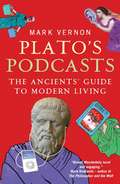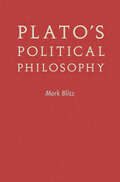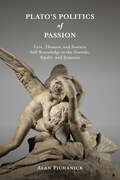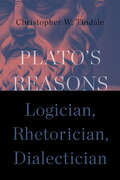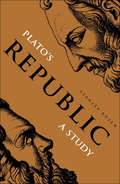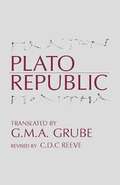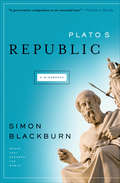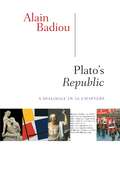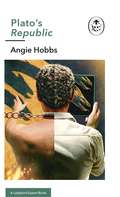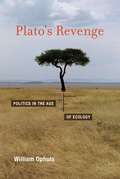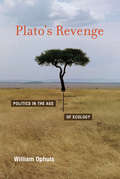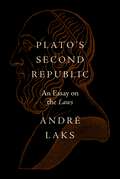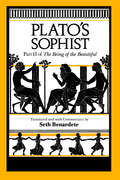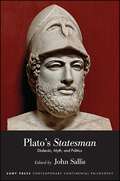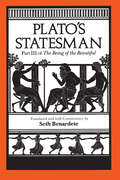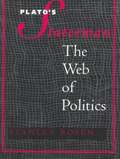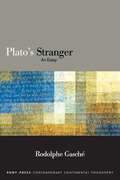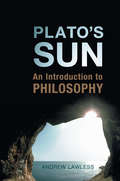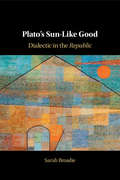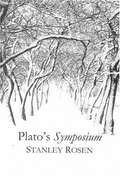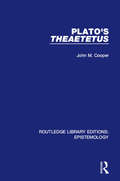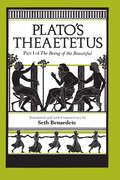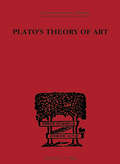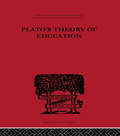- Table View
- List View
Plato's Podcasts: The Ancients' Guide to Modern Living
by Mark VernonDo you ever get the feeling that something went wrong? What with credit crunches, the war on terror, and unemployment, it is natural to hark back to less complicated times. In this witty and inspiring book, Mark Vernon does just that. However, he doesn't just look back to the 1980s - try 400BC! Filled with timeless insight into life, relationships, work and partying, Plato's Podcasts takes a sideways glance at modern living and presents the would-be thoughts of Ancient Philosophers on various topics central to our 21st century existence. With a zany cast of characters - from the Gymnosophists (the naked philosophers) to Diogenes, who lived in a barrel - this is a humorous but enlightening manual to living well today (and two thousand years ago). Mark Vernon is a writer, journalist, broadcaster, academic, and former priest. Author of numerous books including Wellbeing and What Not to Say, he is an Honorary Research Fellow at Birkbeck College, University of London, UK, and a frequent contributor for BBC radio and the BBC webportal.
Plato's Political Philosophy
by Mark BlitzThis comprehensive, yet compact, introduction examines Plato's understanding of law, justice, virtue, and the connection between politics and philosophy.Focusing on three of Plato's dialogues—The Laws, The Republic, and The Statesman—Mark Blitz lays out the philosopher's principal interests in government and the strength and limit of the law, the connection between law and piety, the importance of founding, and the status and limits of political knowledge. He examines all of Plato's discussions of politics and virtues, comments on specific dialogues, and discusses the philosopher's explorations of beauty, pleasure, good, and the relations between politics and reason. Throughout, Blitz reinforces Plato's emphasis on clear and rigorous reasoning in ethics and political life and explains in straightforward language the valuable lessons one can draw from examining Plato's writings.The only introduction to Plato that both gathers his separate discussions of politically relevant topics and pays close attention to the context and structure of his dialogues, this volume directly contrasts the modern view of politics with that of the ancient master. It is an excellent companion to Plato's Dialogues.
Plato's Politics of Passion: Erôs, Thumos, and Socratic Self-Knowledge in the Charmides, Republic, and Symposium (SUNY series in Ancient Greek Philosophy)
by Alan PichanickAn original reading of three Platonic dialogues concerned with the soul, tyranny, self-knowledge, and the beautiful.Guided by the question "What is Socratic self-knowledge," this study begins with Plato's Charmides because it is within this work, more than any other, that the utility of self-knowledge becomes the predominant theme. In this dialogue, Socrates explores the possibility of the very culmination of his philosophical investigations—knowledge of ignorance. This happens through an investigation of the perplexing concept, sôphrosunê. Alan Pichanick's approach offers a new perspective upon the perplexing exploration of sôphrosunê in the Charmides by placing much greater emphasis on the neglected "erotic setting" in the dramatic introduction and argues that our reading of the rest of the dialogue should be done in light of this dramatic setting. The erotic setting of the Charmides combined with the discussion of philosophical wonder in the Symposium and tyrannical erôs in the Republic gives guidance about how to think about the potential connection between Socratic self-knowledge and knowledge of the good and also shows why the characters of Charmides and Critias fail to come to such knowledge. Here we have the Platonic diagnosis of the tyrant, whose soul never wonders at anything beyond itself.
Plato's Reasons: Logician, Rhetorician, Dialectician (SUNY series in Ancient Greek Philosophy)
by Christopher W. TindaleThis book explores Plato's implicit understanding of argumentation by reviewing his standing as a logician, rhetorician, and dialectician. The question of his "standing" on these matters is approached on his terms (gleaned from the dialogues) rather than simply from the judgments of commentators. Traditionally, arguments are distinguished as logical, rhetorical, or dialectical, and the source of these distinctions is taken to be Aristotle. This book proceeds on the assumption that Aristotle's tripartite theory of argumentation did not arise in a vacuum and explores the different degrees to which substantive antecedents of parts of that model can be traced to Plato.
Plato's Republic
by Stanley RosenIn this book a distinguished philosopher offers a comprehensive interpretation of Plato's most controversial dialogue. Treating the "Republic "as a unity and focusing on the dramatic form as the presentation of the argument, Stanley Rosen challenges earlier analyses of the "Republic "(including the ironic reading of Leo Strauss and his disciples) and argues that the key to understanding the dialogue is to grasp the author's intention in composing it, in particular whether Plato believed that the city constructed in the "Republic "is possible and desirable. Rosen demonstrates that the fundamental principles underlying the just city are theoretically attractive but that the attempt to enact them in practice leads to conceptual incoherence and political disaster. The "Republic, "says Rosen, is a vivid illustration of the irreconcilability of philosophy and political practice.
Plato's Republic (Second Edition)
by G. M. A. Grube C. D. C. ReevePlato's famous musings about how society should function. The second edition of this translation.
Plato's Republic: A Biography (Books That Changed the World)
by Simon Blackburn“A clear and accessible introduction to philosophy’s first superstar” by the author of On Truth and Think, one of our great contemporary philosophers (Kirkus Reviews).Plato is perhaps the most significant philosopher who ever lived and The Republic, composed in Athens in about 375 BC, is widely regarded as his most famous dialogue. Its discussion of the perfect city—and the perfect mind—laid the foundations for Western culture and has been the cornerstone of Western philosophy. As the distinguished Cambridge professor Simon Blackburn points out, it has probably sustained more commentary, and been subject to more radical and impassioned disagreement, than almost any other text in the modern world. “A provocative companion to an essential text” (Publishers Weekly), Plato’s Republic explores the judicial, moral, and political ideas in The Republic with dazzling insight. Blackburn also examines The Republic’s influence and staying power, and shows why, from St. Augustine to twentieth-century philosophers such as Ludwig Wittgenstein, Western thought is still conditioned by this most important, and contemporary, of books.“Plato’s Republic . . . which Blackburn rightly suggests is the first book to shake the world, is loaded with perennial questions that every generation must struggle with. How are we to live our lives? What is virtue and can it be taught? Are pleasure and good the same?”—The Independent“Philosopher Simon Blackburn has written a new book about The Republic, gently reminding those of us who have forgotten it why it remains so important. The book unquestionably belongs on anybody’s list of Books That Changed the World.”—NPR
Plato's Republic: A Dialogue in Sixteen Chapters (Gender And Culture)
by Alain BadiouPlato's Republic is one of the best-known and most widely-discussed texts in the history of philosophy. But how might we get to the heart of this work today, 2,500 years after its original composition? Alain Badiou breathes life into Plato's landmark text and revives its universality. Rather than producing yet another critical commentary, he has instead worked closely on the original Greek and, through spectacular changes, adapted it to our times. In this innovative reimagining of Plato's work, Badiou has removed all references specific to ancient Greek society—from lengthy exchanges about moral courage in archaic poetry to political considerations mainly of interest to the aristocratic elite—and has expanded the range of cultural references. Here, philosophy is firing on all cylinders: Socrates and his companions are joined by Beckett, Pessoa, Freud, and Hegel, among others. Together these thinkers demonstrate that true philosophy endures, ready to absorb new horizons without changing its essence.Moreover, Badiou—who is also a dramatist—has transformed the Socratic dialogue into a genuine oratorial contest. In his version of the Republic, the interlocutors do much more than simply agree with Socrates. They argue, stand up to him, put him on the spot, and show thought in motion. In this work of dramatic scholarship and philosophy, we encounter a modern version of Plato's text that is alive, stimulating, and directly relevant to our own world.
Plato's Republic: A Ladybird Expert Book (The Ladybird Expert Series #34)
by Angie HobbsPart of the ALL-NEW LADYBIRD EXPERT SERIES- Why do humans form societies and what is needed for them to thrive?- How can women's potential be actualized?- How can we protect ourselves from demagogues and tyrants?IMMERSE yourself in the strikingly relevant questions of Plato's influential dialogue, exploring the age old dilemma: Why should I be just? What is a just society, and how can it be created?ACCESSIBLE. AUTHORITATIVE. TIMELY.Written by distinguished philosopher and professor Angie Hobbs, Plato's Republic is the essential introduction to a text that helped shape all Western literature and philosophy.
Plato's Revenge
by William OphulsIn this provocative call for a new ecological politics, William Ophuls starts from a radical premise: "sustainability" is impossible. We are on an industrial Titanic, fueled by rapidly depleting stocks of fossil hydrocarbons. Making the deck chairs from recyclable materials and feeding the boilers with biofuels is futile. In the end, the ship is doomed by the laws of thermodynamics and by the implacable biological and geological limits that are already beginning to pinch. Ophuls warns us that we are headed for a postindustrial future that, however technologically sophisticated, will resemble the preindustrial past in many important respects. With Plato's Revenge, Ophuls, author of Ecology and the Politics of Scarcity, envisions political and social transformations that will lead to a new natural-law politics based on the realities of ecology, physics, and psychology. Conventional environmental politics tries to treat the most glaring symptoms of ecological illness while ignoring the anti-ecological dynamic that created them. Ophuls returns to first principles, relying on time-tested classical authors--Plato, Rousseau, Jefferson, Thoreau, and others who have grappled with the fundamental issues of politics. He invites readers to question their most basic social, economic, political, and even moral assumptions, as the first step toward imagining a truly ecological future. In a discussion that ranges widely--from ecology to quantum physics to Jungian psychology to Eastern religion to Western political philosophy--Ophuls argues for an essentially Platonic politics of consciousness dedicated to inner cultivation rather than outward expansion and the pursuit of perpetual growth. We would then achieve a way of life that is materially and institutionally simple but culturally and spiritually rich, one in which humanity flourishes in harmony with nature.
Plato's Revenge: Politics in the Age of Ecology
by William OphulsA provocative essay that imagines a truly ecological future based on political transformation rather than the superficialities of “sustainability.” In this provocative call for a new ecological politics, William Ophuls starts from a radical premise: “sustainability” is impossible. We are on an industrial Titanic, fueled by rapidly depleting stocks of fossil hydrocarbons. Making the deck chairs from recyclable materials and feeding the boilers with biofuels is futile. In the end, the ship is doomed by the laws of thermodynamics and by the implacable biological and geological limits that are already beginning to pinch. Ophuls warns us that we are headed for a postindustrial future that, however technologically sophisticated, will resemble the preindustrial past in many important respects. With Plato's Revenge, Ophuls, author of Ecology and the Politics of Scarcity, envisions political and social transformations that will lead to a new natural-law politics based on the realities of ecology, physics, and psychology.In a discussion that ranges widely—from ecology to quantum physics to Jungian psychology to Eastern religion to Western political philosophy—Ophuls argues for an essentially Platonic politics of consciousness dedicated to inner cultivation rather than outward expansion and the pursuit of perpetual growth. We would then achieve a way of life that is materially and institutionally simple but culturally and spiritually rich, one in which humanity flourishes in harmony with nature.
Plato's Second Republic: An Essay on the Laws
by André LaksAn argument for why Plato&’s Laws can be considered his most important political dialogueIn Plato's Second Republic, André Laks argues that the Laws, Plato&’s last and longest dialogue, is also his most important political work, surpassing the Republic in historical relevance. Laks offers a thorough reappraisal of this less renowned text, and examines how it provides a critical foundation for the principles of lawmaking. In doing so, he makes clear the tremendous impact the Laws had not only on political philosophy, but also on modern political history.Laks shows how the four central ideas in the Laws—the corruptibility of unchecked power, the rule of law, a &“middle&” constitution, and the political necessity of legislative preambles—are articulated within an intricate and masterful literary architecture. He reveals how the work develops a theological conception of law anchored in political ideas about a god, divine reason, that is the measure of political order. Laks&’s reading opens a complex analysis of the relationships between rulers and citizens; their roles in a political system; the power of reason and persuasion, as opposed to force, in commanding obedience; and the place of freedom.Plato's Second Republic presents a sophisticated reevaluation of a philosophical work that has exerted an enormous if often hidden influence even into the present day.
Plato's Sophist: Part II of The Being of the Beautiful
by PlatoTheaetetus, the Sophist, and the Statesman are a trilogy of Platonic dialogues that show Socrates formulating his conception of philosophy as he prepares the defense for his trial. Originally published together as The Being of the Beautiful, these translations can be read separately or as a trilogy. Each includes an introduction, extensive notes, and comprehensive commentary that examines the trilogy's motifs and relationships. "Seth Benardete is one of the very few contemporary classicists who combine the highest philological competence with a subtlety and taste that approximate that of the ancients. At the same time, he as set himself the entirely modern hermeneutical task of uncovering what the ancients preferred to keep veiled, of making explicit what they indicated, and hence...of showing the naked ugliness of artificial beauty."—Stanley Rose, Graduate Faculty Philosophy Journal Seth Benardete (1930-2001) was professor of classics at New York University. He was the author or translator of many books, most recently The Argument of the Action, Plato's "Laws," and Plato's "Symposium," all published by the University of Chicago Press.
Plato's Statesman: Dialectic, Myth, and Politics (SUNY series in Contemporary Continental Philosophy)
by John SallisThe Statesman is among the most widely ranging of Plato's dialogues, bringing together in a single discourse disparate subjects such as politics, mathematics, ontology, dialectic, and myth. The essays in this collection consider these subjects and others, focusing in particular on the dramatic form of the dialogue. They take into account not only what is said but also how it is said, by whom and to whom it is said, and when and where it is said. In this way, the contributors approach the text in a manner that responds to the dialogue itself rather than bringing preconceived questions and scholarly debates to bear on it. The essays are especially attuned to the comedic elements that run through much of the dialogue and that are played out in a way that reveals the subject of the comedy. In the Statesman, these comedies reach their climax when the statesman becomes a participant in a comedy of animals and thereby is revealed in his true nature.
Plato's Statesman: Part III of The Being of the Beautiful
by PlatoTheaetetus, the Sophist, and the Statesman are a trilogy of Platonic dialogues that show Socrates formulating his conception of philosophy as he prepares the defense for his trial. Originally published together as The Being of the Beautiful, these translations can be read separately or as a trilogy. Each includes an introduction, extensive notes, and comprehensive commentary that examines the trilogy's motifs and relationships. "Seth Benardete is one of the very few contemporary classicists who combine the highest philological competence with a subtlety and taste that approximate that of the ancients. At the same time, he as set himself the entirely modern hermeneutical task of uncovering what the ancients preferred to keep veiled, of making explicit what they indicated, and hence...of showing the naked ugliness of artificial beauty."—Stanley Rose, Graduate Faculty Philosophy Journal Seth Benardete (1930-2001) was professor of classics at New York University. He was the author or translator of many books, most recently The Argument of the Action, Plato's "Laws," and Plato's "Symposium," all published by the University of Chicago Press.
Plato's Statesman: The Web Of Politics
by Stanley RosenIn this book an eminent philosopher presents a rich and provocative analysis of the Statesman, one of Plato's most challenging works. Stanley Rosen contends that the main theme of this dialogue is defining the art of politics and the degree to which political experience is subject to the rule of sound judgment (phronesis) and to technical construction (techne). "Rosen tries by explaining the dialogue's philosophical methodology to appeal to readers other than those who specialize in Plato. He succeeds by means of his lucid prose and ordered presentation of the dialogue's twists and turns. A necessary book for all levels of thoughtful readers."-Choice "[Rosen] succeeds . . . in presenting the often obscure intellectual challenges of the dialogue, and so deserves careful consideration from students of Plato."-Kinch Hoekstra, Times Literary Supplement "The Statesman may well be Plato's most difficult work. Rosen's interpretation is penetrating and original, with a rich and humorous description of the recalcitrant details of the dialogue."-David K. O'Connor, University of Notre Dame
Plato's Stranger: An Essay (SUNY series in Contemporary Continental Philosophy)
by Rodolphe GaschéThe dramatic introduction in two of Plato's late dialogues—the Sophist and the Statesman, both part of a trilogy that also includes the Theaetetus—of a stranger, the Eleatic Stranger, who replaces Socrates, is a consequential move, especially since it occurs in the context of decidedly new insights into the philosophical logos and life together in a community. The introduction of a radical stranger, a stranger to all native identity, has theoretical implications, and, rather than a rhetorical or merely literary device, is of the order of an argument. Plato's Stranger argues that in these late dialogues, Plato bestows on the West a philosophical and political legacy at the core of which the stranger holds a prominent place because it provides the foreigner—the other—with a previously unheard-of constitutive role in the way thinking, as well as life in community, is understood. What is to be learned from these late dialogues is that, without a constitutive relation to otherness, discursive and political life in a community—in other words, also of the way one relates to oneself—remain lacking.
Plato's Sun
by Andrew LawlessWriting an introductory text for philosophy is an exceedingly difficult task. The discipline has spent a century or more in existential crisis with the attack on metaphysics dating back at least to Nietzsche and carried forward in different ways by Heidegger, Wittgenstein, and Derrida, to name a few. This constant upheaval has precipitated a climate of self-doubt that goes to the core of philosophy, the result being a strange discipline with many of its most illustrious names proudly announcing its demise.In Plato's Sun, Andrew Lawless takes on the challenge of creating an introductory text for philosophy, arguing that such a work has to take into account of the strangeness of the field and divulge it, rather than suppress it beneath traditional certainties and authoritative pronouncements. Lawless writes within the shadow of post-modern anti-metaphysical skepticism, introducing some of the principal areas of philosophy: metaphysics, epistemology, logic, ethics, and language.Lawless's concern is not to resolve the issues he raises so much as to set them out in a way that lets the reader experience something of the philosopher's struggle. In so doing, Lawless holds fast to the Socratic vision of philosophy as a process of inquiry that values questions above answers, pushing the inquirer beyond his or her answers. With numerous pedagogical features including glossaries of names and key terms, suggested readings, and short chapter summaries, Plato's Sun will be an essential text to new students of philosophy and an important aid in teaching the subject.
Plato's Sun-Like Good: Dialectic in the Republic
by Sarah BroadiePlato's Sun-Like Good is a revolutionary discussion of the Republic's philosopher-rulers, their dialectic, and their relation to the form of the good. With detailed arguments Sarah Broadie explains how, if we think of the form of the good as 'interrogative', we can re-conceive those central reference-points of Platonism in down-to-earth terms without loss to our sense of Plato's philosophical greatness. The book's main aims are: first, to show how for Plato the form of the good is of practical value in a way that we can understand; secondly, to make sense of the connection he draws between dialectic and the form of the good; and thirdly, to make sense of the relationship between the form of the good and other forms while respecting the contours of the sun-good analogy and remaining faithful to the text of the Republic itself.
Plato's Symposium
by Plato Allan Bloom Seth BenardetePlato, Allan Bloom wrote, is "the most erotic of philosophers," and his Symposium is one of the greatest works on the nature of love ever written. This new edition brings together the English translation of the renowned Plato scholar and translator, Seth Benardete, with two illuminating commentaries on it: Benardete's "On Plato's Symposium" and Allan Bloom's provocative essay, "The Ladder of Love." In the Symposium, Plato recounts a drinking party following an evening meal, where the guests include the poet Aristophanes, the drunken Alcibiades, and, of course, the wise Socrates. The revelers give their views on the timeless topics of love and desire, all the while addressing many of the major themes of Platonic philosophy: the relationship of philosophy and poetry, the good, and the beautiful.
Plato's Symposium (Carthage Reprint)
by Stanley RosenThis is the first full-length study of the Symposium to be published in English, and one of the first English works on Plato to take its bearings by the dramatic form of the Platonic dialogue, a thesis that was regarded as heterodox at the time but which today is widely accepted by scholars of the most diverse standpoint. Rosen was also one of the first to study in detail the philosophical significance of the phenomenon of concrete human sexuality, as it is presented by Plato in the diverse characters of the main speakers in the dialogue. His analysis of the theoretical significance of pederasty in the dialogue was highly controversial at the time, but is today accepted as central to Plato's dramatic phenomenology of human existence. Rosen discusses a variety of topics that had previously been neglected in the secondary literature, including the problem of the hybristic nature of the philosopher, the poetical dimension of Plato's conception of philosophy, and the theoretical implication of the difference between Platonic writing and Socratic conversation.
Plato's Theaetetus (Routledge Library Editions: Epistemology)
by John M. CooperOriginally published in 1990. This book discusses in a philosophically responsible and illuminating way the progress of the dialogue and its separate sections to improve our understanding of Plato’s work on Theaetetus. An early coverage of this dialogue, this investigation predated a surge in study of Plato’s piece which examined Socratic and pre-Socratic thought. The author’s argument is that the Theaetetus engages in re-evaluation of earlier doctrines of middle-period Platonism as well as reaffirming theories about knowledge. An important work in Platonic studies and epistemology.
Plato's Theaetetus: Part I of The Being of the Beautiful
by PlatoTheaetetus, the Sophist, and the Statesman are a trilogy of Platonic dialogues that show Socrates formulating his conception of philosophy as he prepares the defense for his trial. Originally published together as The Being of the Beautiful, these translations can be read separately or as a trilogy. Each includes an introduction, extensive notes, and comprehensive commentary that examines the trilogy's motifs and relationships. "Seth Benardete is one of the very few contemporary classicists who combine the highest philological competence with a subtlety and taste that approximate that of the ancients. At the same time, he as set himself the entirely modern hermeneutical task of uncovering what the ancients preferred to keep veiled, of making explicit what they indicated, and hence...of showing the naked ugliness of artificial beauty."—Stanley Rose, Graduate Faculty Philosophy Journal Seth Benardete (1930-2001) was professor of classics at New York University. He was the author or translator of many books, most recently The Argument of the Action, Plato's "Laws," and Plato's "Symposium," all published by the University of Chicago Press.
Plato's Theory of Art (International Library of Philosophy)
by Rupert C. LodgeFirst published in 2000. Routledge is an imprint of Taylor & Francis, an informa company.
Plato's Theory of Education (International Library of Philosophy)
by R C LodgeFirst published in 2000. Routledge is an imprint of Taylor & Francis, an informa company.
